If you like this blog, send it to 3 (or more) of your friends and encourage them to sign up. Let’s keep the conversation going!
As many people who are in the disability community say, we are all, at best, only temporarily able-bodied. In the past year, I have left the world of the temporarily abled. I now walk sometimes with a cane and other times with a wheeled-walker. I need something to grab onto in the shower so I won’t fall down, and I need to sit in the shower, too. I get 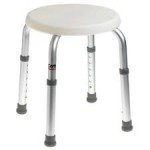 tired walking long distances. To be heard, I have to speak with the help of technology.
tired walking long distances. To be heard, I have to speak with the help of technology.
As I walk (slowly) around in the world these days, I notice how many people are hampered in someway by physical problems. I realize that what accessibility means to me is not necessarily what it means to others, even those who believe they are being responsive to people with limited mobility.
I thought a few examples of what I expected versus what I found might be illuminating.
On the Road: Thinking About Hotel Accommodations
When I traveled recently, I asked on two different occasions for hotel rooms that were accessible for people with disabilities. I told the reservations people that I didn’t need wheelchair accessibility, but I did need grab bars and a seat in the shower. The hotels were able to provide rooms with these facilities, but that was about as far as the accommodations for accessibility went.
I naively assumed, for example, that rooms with these accommodations might be located relatively close to the elevator core. In one case, the room I was given was about as far 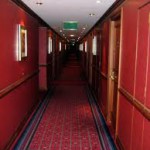 from the elevator core as one could possibly be. My pedometer showed a lot of steps, but I would have been happier accruing them by walking along the shore of Lake Louise, where I was visiting.
from the elevator core as one could possibly be. My pedometer showed a lot of steps, but I would have been happier accruing them by walking along the shore of Lake Louise, where I was visiting.
More generally, I also expected that thought would have been given to making doors to public spaces – not only the doors to the guest rooms, but also those used to enter and exit the hotel and the lobby restrooms – usable by people using walkers or wheelchairs. You know, those automated doors that either open when someone approaches 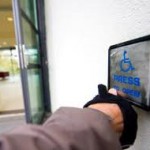 or open when a disability access button near the door is touched.
or open when a disability access button near the door is touched.
In both hotels, there were few if any automated doors; in one, there were no disability access buttons. It would have taken me quite a while to enter or exit the building through most of their doors if I hadn’t been accompanied by my partner who could open the doors and hold them open for me.
In the second hotel, the room I was close to the elevator core, but to get into the room I had to lift my rolling walker over a floor barrier that didn’t need to be there. The bathroom was tiny: my walker wouldn’t fit through the door. And all the bath towels were placed on shelf that would have been out of reach to anyone in wheelchair. That hotel had some automatic entry doors, but the main floor women’s bathroom had a non-automated door that is so heavy (or sticky) that it was hard for able-bodied women to open it. A man staffing the concierge desk right outside that bathroom commented to me on the need to fix the door, so the hotel knows about that problem. It’s not clear whether the management knows that where there is a button to make doors open automatically, the button didn’t work.
A Cabin in the Park
Hotels aren’t the only visitor facilities that present challenges to those of us who need some accessibility accommodations. On an earlier trip to a beautiful park in Oregon called Opal  Creek, we were with a group that, in light of my limitations, had reserved the accessible cabin. There was a completely accessible bathroom on the main floor, but there were challenges in the kitchen. The dishes were all placed on high shelves that people of normal height had trouble reaching, and that would have been impossible for someone in a wheelchair to reach. The refrigerator had no handle, requiring finger dexterity and strength to open.
Creek, we were with a group that, in light of my limitations, had reserved the accessible cabin. There was a completely accessible bathroom on the main floor, but there were challenges in the kitchen. The dishes were all placed on high shelves that people of normal height had trouble reaching, and that would have been impossible for someone in a wheelchair to reach. The refrigerator had no handle, requiring finger dexterity and strength to open.
When these issues were brought to the attention of the Opal Creek management, the response was concern and a commitment to addressing the issues as soon as possible.
If only the corporate world that owns most everything would respond so positively.
Climbing Stairs for Accessibility?
Given our experience in Phoenix where we went for a weekend to watch the (wait ’til next year) San Francisco Giants at spring training, I think that kind of response from corporate interests may be a long time in coming. Here’s a “what were they thinking?” story. At a motel where we spent one night, our friend was placed in the accessible room (not that she needed it). It had a wheel-in shower alright, but you had to climb a flight of stairs to get to 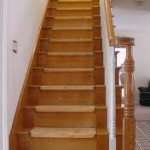 the room (the elevator didn’t go that high), and the room was not large enough to allow a wheelchair to circle the bed.
the room (the elevator didn’t go that high), and the room was not large enough to allow a wheelchair to circle the bed.
Is Separate the Same as Equal?
Possibly less offensive, but thought provoking, is our experience at a showroom warehouse in San Francisco recently. They had a concrete ramp to a side entry door, but the door was locked. When we pointed this issue out to the owner, he was quite apologetic and told us that all we had to do was call first. I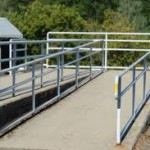 didn’t tell him (because I have trouble speaking) that I don’t even have a cell phone anymore, and don’t talk on the phone. Oh, and there was no phone number to call was posted on the exterior of the building.
didn’t tell him (because I have trouble speaking) that I don’t even have a cell phone anymore, and don’t talk on the phone. Oh, and there was no phone number to call was posted on the exterior of the building.
The fact that I need assistance to walk and to talk makes me very sensitive to the fact that there all kinds of physical limitations that might pose challenges for people. I have focused here on the ones that have affected me so far. What am I missing? And what can we do about it?
© Barbara A. Brenner 2011

My husband has needed accessibility facilities at various times, and my impression is that newer hotels do a much better job on getting the ideas right, as opposed to older places that are being retrofitted, and which might, for example, make a larger room far from the elevator handicap accessible because it has the space for them to do so. The cruise ships, for the most part, get it right, perhaps because they generally have a number of handicapped passengers. I think that, unless you are actually in the situation, it is hard to for able-bodied people to envision what the issues are, and the best bet is to tell management directly when one encounters problems, so that they can hopefully be fixed for the next guests, and if a problem seems to be endemic in the industry, both to let the corporate headquarters of chain hotels know, and perhaps to give this information to hospitality trade magazines. I will say that when we have traveled with a wheelchair we have found hotels and restaurants to be helpful and extremely willing to accommodate us.
Great blog, Barbara. It is amazing how attentive we become to these issues once we or someone close to us experiences accessibility issues. I have had two foot surgeries in recent years both of which required months of recovery on crutches during which I was unable to put any weight on one of my feet. I soon learned how completely impossible even supposedly accessible access can become for reasons which are overlooked such as, as you mentionned above, doors that are too heavy or bars not placed in the right location. Keep up the good work. I think of you often. Nina
Those smoke-free rooms which have been housing a smoker, and then the hotel sprays with some scent never even found in the back of a barn; flush toilets which work with push-button flushers, not handles which require pressure; airless rooms, which prevent the current occupant from having even a breath off fresh air (to also state that many rooms DO need an airing); a call, perhaps, from the front desk, asking if there is anything they could do to make the stay better; a lower bar for hanging clothes – totally possible to have upper and lower bars for part of the closets; option for a mite-free pillow (I think many people take their own pillows)- perhaps hotels and motels and inns should be aware of breathing difficulties which could be aggravated by “old” pillows and linens. I’ll stop here, but there is much more!
Great idea to present these concerns, Barbara – some could be life-threatening.
There are very specific federal requirements for handicapped accessibility under the ADA. The hitch is that when the ADA was passed, Congress made the ADA requirements applicable only to new construction and to existing buildings undergoing renovation. The original legislation also required owners of public places to remove physical barriers, but only if the removal was “readily achievable” – meaning that it could be easily done without much difficulty or cost.
As a result, many buildings continue to lack handicap access, even though the law has been on the books since 1992.
So, my dear, you may have yet another new calling. Private citizens can bring action against non-compliant owners of public spaces, but the process is usually lengthy, as you well know, and would do nothing to address public spaces that have not been renovated.
Perhaps it is time for a coalition (BB, the ACLU, AARP ???) to approach the hotel and travel industries and discuss what handicapped travelers need to have and a new time frame to provide these accommodations. Given the aging of us boomers, might it be possible that certain hotel/restaurant chains would want to be known as theplace where one can be assured of well designed handicapped accessible spaces? Start a competition to see which hotel comes up with the most effective design/layout? Competition and fear of losing out on booomers’ dollars may get us where we wish to go faster than lawsuits. Is this a proposal of “if you can’t beat ’em, join ’em?” or is it more like the competition my mother announced, giving the dessert of choice to the sibling who cleaned up her room best and fastest?
Thanks, Barbara. So great you are doing these blogs. I am passing on the blog link to some people. I think of you and hope you are having some good days. –Gen
Thanks, Barbara. So great you are doing these blogs. I am passing on the blog link to some people. How great that you got to visit Lake Louise, despite the less than accessible accommodations. I know it is a favorite place of yours. I think of you and hope you are having some good days. –Gen
What about planes? Does anyone know if 1 airline is better than others for the big powerchairs. My husband cannot transfer without a lift or some very strong men.
I was wondering if you had posted this question to the ALS Forum at Patients Like Me? There are a lot more people familiar with ALS issues (I’m not assuming your husband has ALS, but the symptoms he has are familiar to ALS people), and they might have an answer for you.
All the best,
Barbara Brenner (aka BBZinger)
How about restaurants that you can get a wheelchair into, but the tables are too low to get the arms of a wheelchair under? You end up sitting so far back from the table it’s impossible to reach the plate….
My perception is that hospitality and retail industries are very much moved to action by public criticism… cf such sites as flyertalk and tripadvisor. Airlines don’t seem to be so sensitive to what the public thinks, and the various rules (that can be overridden by the captain’s discretion) are difficult for people with ALS who don’t fly frequently and for airline personnel who don’t get it. Perhaps a resource with the rights of flyers with ALS would be helpful for people with ALS to have and to be able to hand to airline staff or crew.
In the bigger picture, I think we have some “speak up and be heard” issues and we have some education/awareness/civil rights issues.
The “speak up and be heard” can make use of the same online tools that taught us that United Breaks Guitars and that you can check a hotel’s bedbug history.
Perhaps some of the education/awareness/civil rights issues could get some attention if some folks would blog their accessibility experiences going to ALSA’s Advocacy Conference in Washington, DC. That could be interesting.
I will look for blogs from the ALSA Advocacy Conference, but I have no intention to attend. My experience with large health organizations like ALSA is that they are too big and too stodgy to get much done that’s of value to patients.
Good article and insightful observations.
I am about to embark on my first trip overseas since my ALS diagnosis in May 2011.
While I’m still mobile, I do use a wheeled walker for longer walks. My left arm and hand are very weak and my right is following suit.
My partner and I are traveling to Iceland and the U.K. (my family are in the U.K.).
I believe this trip will be telling tale for me in regards to accessibility and the ease of getting around when you’re hindered by your body’s capabilities.
I don’t think I would have the confidence to travel any distance alone and given the lack of accessibility I’ve witnessed in my home town of Toronto it would not be wise either.